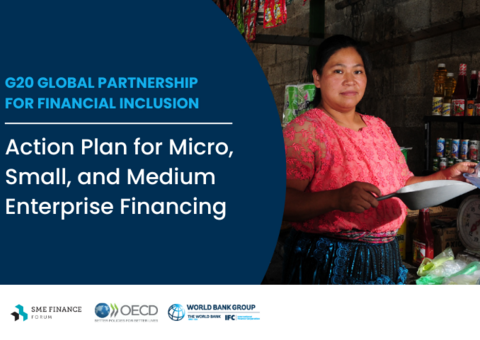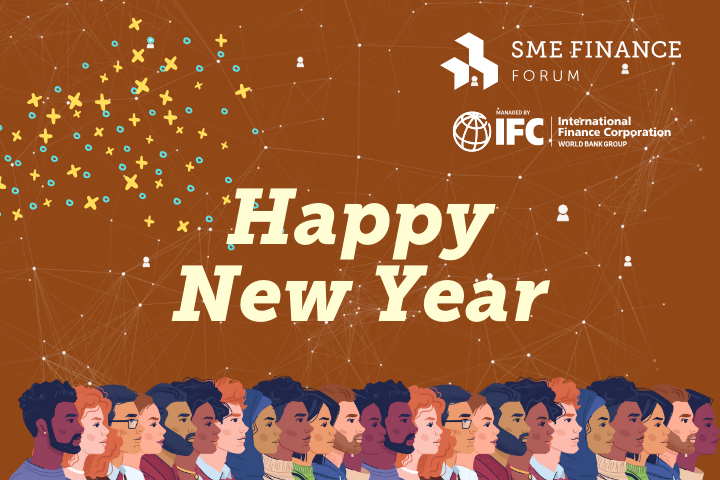Blog
G20 Global Partnership for Financial Inclusion - Action Plan for MSME Financing

Advancing MSME Finance: Insights from the G20 Global Partnership Action Plan for MSME Financing Webinar
The IFC and World Bank, in collaboration with the SME Finance Forum, and OECD, recently convened a virtual session to present the G20 Action Plan for MSME (Micro, Small, and Medium Enterprises) Financing. This note synthesizes key insights from the webinar, offering an overview of the action plan, country case studies, and institutional strategies to close the MSME financing gap.
The G20 Action Plan: A Two-Pillar Framework
The G20 Action Plan is structured around two core pillars—horizontal and vertical actions—designed to address systemic barriers and catalyze targeted interventions.
Horizontal Actions: Strengthening the Enabling Environment
-
Credit Infrastructure: Improve credit reporting systems using alternative data and lenders; simplify insolvency regimes; and complete frameworks for secured transactions and movable collateral registries.
-
Funding Diversification: Develop regulatory frameworks for alternative lenders and equity financing and promote open finance to foster competition.
-
Fintech Enablement: Ensure robust digital infrastructure—digital IDs, payments, and data exchange systems—to support fintech innovation.
-
Risk Management: Establish frameworks for responsible lending, data protection, and cybersecurity.
-
Vertical Actions: Enhancing Targeted Interventions
-
Targeting: Improve data collection (including gender-disaggregated data) and diagnostics to better identify financing gaps.
-
Financial Additionality: Mobilize private capital, use concessional finance sparingly, and leverage development finance through innovative approaches.
-
Non-Financial Support: Build capacity among SMEs and financial institutions and promote financial education.
-
Accountability: Strengthen monitoring and evaluation systems and ensure robust governance and coordination.
-
Country Case Studies
India: Digital Public Infrastructure and Inclusive Growth
India’s MSME sector is significant with 64 million registered MSMEs employing 275 million persons and contributing 31.3% to GDP. India’s multi-pronged MSME financing strategy presented during the webinar includes formalization, credit guarantees, and equity infusion.
The number of registered MSMEs surged from 16 million to 64 million in under two years, thanks to simplified digital registration processes (Udyam and Udyam Assist initiatives).
The government’s Self-Reliant India Fund has helped MSMEs scale up, with 10% moving to higher enterprise classifications.
India’s digital public infrastructure—such as the Unified Payments Interface (UPI), account aggregators, and GST Sahai (invoice-based financing)—has enabled seamless digital payments and credit assessments.
The “seven A’s” framework (Availability, Accessibility, Affordability, Awareness, Alliance, Accountability, Achievements) was introduced as a holistic policy lens.
The PM Vishwakarma scheme, a recent initiative for artisans, exemplifies this approach by integrating skilling, digital identity, concessional loans, and e-commerce access. It supports 3 million artisans.
Italy: Credit Reporting and Financial Literacy
Italy’s experience emphasized the importance of robust credit information systems (CRS). The country operates both public and private credit registries that tackle information asymmetry.
Private CRS include data from utilities, and public CRS include data from all financial institutions, with evidence showing that inclusion in public CRS led to a 21–40 basis point reduction in interest rates.
Italy is also experimenting, through sandboxes, with AI and alternative data to assess creditworthiness.
Another key focus in Italy’s support to MSMEs is financial literacy. Italy developed a tailored diagnostic survey and education program for microenterprises, recognizing that borrower’s opacity and self-exclusion from credit markets are major barriers. Early findings suggest that improved financial literacy enhances access to credit and public support programs.
South Africa: Khula Credit Guarantee (KCG)
South Africa presented the Khula Credit Guarantee (KCG) scheme as a targeted intervention. KCG is a state-owned partial credit guarantee scheme for MSMEs lacking collateral. It offers hybrid guarantees with a coverage range of 50 to 90% of the loan value. Initially hampered by high default rates and limited reach, the scheme was revamped with World Bank support to adopt portfolio guarantees and hybrid models. This shift improved performance, with FY2024/25 guarantees exceeding targets by 335%. Other key achievements of the program are:
-
Solvency ratio of 3.31 in March 2024 (well above the 1.5 benchmark).
-
60% of guarantees are issued through non-bank and supplier-finance partners.
-
R300 million EU donor capital secured in 2022.
-
83% of job creation targets were achieved, with 86,000 jobs supported through incubation centers.
-
KCG has expanded access to underserved groups—black-owned businesses, women, youth, and rural enterprises. However, challenges remain, including high non-performing loan rates (43% for individual guarantees, 10–18% for portfolio guarantees), limited IT capacity, evaluation gap and a recent institutional merger that temporarily paused guarantee issuance pending ministerial approval.
Institutional Perspectives
World Bank: Foundations First
The World Bank emphasized the need for governments in emerging markets and developing economies (EMDEs) to prioritize enabling environment reforms — including issues such as credit infrastructure, collateral frameworks, and insolvency regimes— and to deploy financial interventions, as a complement rather than a substitute for such reforms. Examples from Tanzania (alternative data for credit reporting) and Nigeria (wholesale lending and guarantees which mobilized $1.6 billion for 300,000 MSMEs, creating over 100,000 jobs) illustrated how enabling reforms and targeted interventions can work in tandem.
The Bank is supporting EMDEs to implement these interventions through diagnostics and advisory support, as well as lending operations. The Bank also highlighted its commitment to gender-inclusive finance, with 77% of MSME operations addressing the finance gender gap.
It is also investing in knowledge products like the “Boosting MSME Finance for Growth” report.
IFC: Catalytic Capital and Risk Sharing
The International Finance Corporation (IFC) is scaling up its MSME Finance Platform, a $4 billion initiative combining loans, risk-sharing facilities, and catalytic first-loss capital. The platform aims to mobilize $8 billion in total, with a strong focus on local currency solutions and gender/climate investing.
IFC is also supporting fintechs, debt funds, and non-bank financial institutions. It stresses the importance of responsible lending, cybersecurity, and consumer protection as digital finance expands. By offering flexible, tailored financing, IFC seeks to crowd in-private capital and de-risk MSME lending.
OECD: Data, Benchmarks, and Equity
The OECD’s SME Financing Scoreboard, covering 50 countries, shows a challenging environment: rising interest rates, falling loan volumes, and declining venture capital (fell 34% in 2023). Bankruptcy rates are rising, underscoring the urgency of action.
The OECD is supporting implementation of the G20 Action Plan through benchmarking tools, gender-disaggregated data initiatives (e.g., We-Fi Code), and sustainability reporting frameworks. It also highlighted successful insolvency reforms in Singapore and Croatia, and equity financing initiatives targeting women and green tech.
Practical Implications
-
Leverage Digital Infrastructure: Digital IDs, payment systems, and data-sharing platforms are essential for expanding access and reducing costs.
-
Design Smart Interventions: Credit guarantees, equity funds, and blended finance must be well-targeted, catalytic, and fiscally sustainable.
-
Invest in Data and Diagnostics: Disaggregated data enables better targeting, monitoring, and policy design.
-
Promote Financial Literacy: Tailored education for MSMEs enhances creditworthiness and uptake of financial services.
-
Foster Public-Private Collaboration: Governments, DFIs, fintechs, and banks must work together to build inclusive financial ecosystems.









